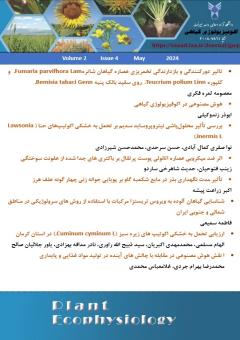Artificial Intelligence in Plant Ecophysiology
Subject Areas : Journal of plant ecophysiology
1 - گروه کامپیوتر، واحد جیرفت، دانشگاه آزاد اسلامی، جیرفت، ایران
Keywords: Artificial intelligence, Artificial neural network, Machine learning, Optimization algorithms,
Abstract :
Objective: The research paper aims to explore how artificial intelligence (AI) can enhance our understanding of plant responses to environmental factors, optimize agricultural practices, and support sustainable ecosystem management. It reviews current trends, findings, and prospects of AI in plant physiology and ecology. The paper seeks to highlight both the benefits and challenges of using AI in plant science, ultimately contributing to innovative strategies that improve agricultural productivity, resilience, and sustainability amid climate change and global environmental challenges. Methods: To investigate the applications of artificial intelligence in plant ecophysiology, a thorough review of the existing literature was conducted. Relevant research articles, review papers, and technical documents were sourced from reputable academic databases such as PubMed, Web of Science, and Google Scholar. The search strategy involved using keywords related to artificial intelligence, plant physiology, plant-environment interactions, machine learning, deep learning, and computer vision. Results: Overall, the results demonstrate the potential of AI to revolutionize plant science research and contribute to addressing critical challenges in plant physiology, ecology, and ecosystem management. Conclusions: The integration of AI in plant ecophysiology offers significant advancements for agriculture and ecosystem management. AI technologies like machine learning can predict plant responses to environmental changes, optimize resource use, and boost crop yields. By enhancing our understanding of plant stress, genetics, and plant-microbe interactions, AI promotes sustainable farming and strengthens ecosystem resilience. This research highlights the transformative potential of AI in advancing plant science, leading to more efficient agricultural practices that contribute to global food security and environmental sustainability.
Asnicar, F., Thomas, A. M., Passerini, A., Waldron, L., & Segata, N. (2024). Machine learning for microbiologists. Nature Reviews Microbiology, 22(4), 191-205.
Daase, C., Haertel, C., Nahhas, A., Volk, M., Steigerwald, H., Ramesohl, A., . . . Turowski, K. (2023). Following the digital thread–a cloud-based observation. Procedia Computer Science, 217, 1867-1876.
Hayes, P., & Bell, C. (2020). Vineyard focus: What's app-ning in vineyard tech? Australian and New Zealand Grapegrower and Winemaker(674).
Ibrahim, I. M., Belanger, J., Shehata, A. S., Shehata, A. I., & Davol, A. (2022). Enhancement of photovoltaic power farms using a new power prediction approach. International Journal of Energy Research, 46(4), 4222-4246.
Jafar, A., Bibi, N., Naqvi, R. A., Sadeghi-Niaraki, A., & Jeong, D. (2024). Revolutionizing agriculture with artificial intelligence: plant disease detection methods, applications, and their limitations. Frontiers in Plant Science, 15, 1356260.
Javaid, M., Haleem, A., Khan, I. H., & Suman, R. (2023). Understanding the potential applications of Artificial Intelligence in Agriculture Sector. Advanced Agrochem, 2(1), 15-30.
Joram, P., Dauzat, M., Bédiée, A., & Vile, D. (2021). Relamping PHENOPSIS a high throughput phenotyping platform with LEDs. Paper presented at the IX International Symposium on Light in Horticulture 1337.
Kanojia, V. (2024). Artificial intelligence and smart farming: An overview varsha kanojia, a. subeesh, and NL Kushwaha. Artificial Intelligence and Smart Agriculture: Technology and Applications, 1.
Katimbo, A., Rudnick, D. R., Zhang, J., Ge, Y., DeJonge, K. C., Franz, T. E., . . . Duan, J. (2023). Evaluation of artificial intelligence algorithms with sensor data assimilation in estimating crop evapotranspiration and crop water stress index for irrigation water management. Smart Agricultural Technology, 4, 100176.
Kurucan, M., Özbaltan, M., Yetgin, Z., & Alkaya, A. (2024). Applications of artificial neural network based battery management systems: A literature review. Renewable and Sustainable Energy Reviews, 192, 114262.
Li, Y., Li, S., Sun, X., & Hao, D. (2022). Prediction of carbon dioxide production from green waste composting and identification of critical factors using machine learning algorithms. Bioresource Technology, 360, 127587. doi:https://doi.org/10.1016/j.biortech.2022.127587
Messeri, L., & Crockett, M. (2024). Artificial intelligence and illusions of understanding in scientific research. Nature, 627(8002), 49-58.
Morimoto, T., & Hashimoto, Y. (2000). AI approaches to identification and control of total plant production systems. Control Engineering Practice, 8(5), 555-567. doi:https://doi.org/10.1016/S0967-0661(99)00176-8
Tardaguila, J., Stoll, M., Gutiérrez, S., Proffitt, T., & Diago, M. P. (2021). Smart applications and digital technologies in viticulture: A review. Smart Agricultural Technology, 1, 100005.
Wilkening, J. V., Feng, X., Dawson, T. E., & Thompson, S. E. (2024). Different roads, same destination: The shared future of plant ecophysiology and ecohydrology. Plant, Cell & Environment.

